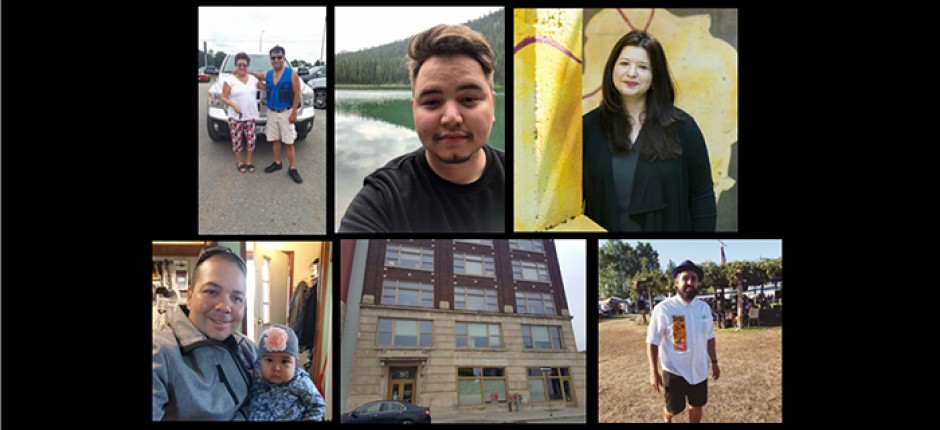By Jasmine Kabatay
- About
- J-Talks
- CJF Awards
- Award Categories
- CJF Hinton Award for Excellence in AI Safety Reporting
- CJF Award for Climate Solutions Reporting
- Lifetime Achievement Award
- CJF Dr. Eric Jackman Award for Excellence in Journalism
- CJF Tribute
- CJF Edward Burtynsky Award for Climate Photojournalism
- The Landsberg Award
- CJF Special Citation 2025: The Toronto Star
- 2026
- 2025
- 2024
- 2023
- 2022
- 2021
- 2020
- 2019
- Award Categories
- Fellowships
- CJF Indigenous Health Journalism Fellowship
- CJF Bursary for BIPOC Student Journalists
- CJF Black Journalism Fellowships
- CJF-CBC Indigenous Journalism Fellowship
- Jury
- CJF-CBC Indigenous Journalism Recipients
- 2025 CJF-CBC Indigenous Journalism Fellow
- 2024 CJF-CBC Indigenous Journalism Fellows
- 2023 CJF-CBC Indigenous Journalism Fellows
- 2022 CJF-CBC Indigenous Journalism Fellows
- 2021 CJF-CBC Indigenous Journalism Fellows
- 2020 CJF-CBC Indigenous Journalism Fellows
- 2019 CJF-CBC Indigenous Journalism Fellows
- 2018 CJF-CBC Indigenous Journalism Fellows
- 2017 CJF-CBC Indigenous Journalism Fellows
- 2016 CJF-CBC Indigenous Journalism Fellows
- 2015 CJF-CBC Indigenous Journalism Fellows
- 2014 CJF-CBC Indigenous Journalism Fellows
- Tom Hanson Photojournalism
- Research and Education
- CJF NextGen Creator-Journalists Training Program
- Research
- Digital deception now a ‘daily reality’ for nearly half of Canadians, new survey reveals
- Canadians want transparent media AI policy, poll says
- CJF & Maru Public Opinion: Media Literacy in the Age of AI
- Poisoned Well: Industry Roundtable on Journalists and Online Hate
- Canadians on Misinformation and Coronavirus
- Media Literacy
- The Shattered Mirror
- Supporters
- DONATE NOW

- About
- J-Talks
- CJF Awards
- Award Categories
- CJF Hinton Award for Excellence in AI Safety Reporting
- CJF Award for Climate Solutions Reporting
- Lifetime Achievement Award
- CJF Dr. Eric Jackman Award for Excellence in Journalism
- CJF Tribute
- CJF Edward Burtynsky Award for Climate Photojournalism
- The Landsberg Award
- CJF Special Citation 2025: The Toronto Star
- 2026
- 2025
- 2024
- 2023
- 2022
- 2021
- 2020
- 2019
- Award Categories
- Fellowships
- CJF Indigenous Health Journalism Fellowship
- CJF Bursary for BIPOC Student Journalists
- CJF Black Journalism Fellowships
- CJF-CBC Indigenous Journalism Fellowship
- Jury
- CJF-CBC Indigenous Journalism Recipients
- 2025 CJF-CBC Indigenous Journalism Fellow
- 2024 CJF-CBC Indigenous Journalism Fellows
- 2023 CJF-CBC Indigenous Journalism Fellows
- 2022 CJF-CBC Indigenous Journalism Fellows
- 2021 CJF-CBC Indigenous Journalism Fellows
- 2020 CJF-CBC Indigenous Journalism Fellows
- 2019 CJF-CBC Indigenous Journalism Fellows
- 2018 CJF-CBC Indigenous Journalism Fellows
- 2017 CJF-CBC Indigenous Journalism Fellows
- 2016 CJF-CBC Indigenous Journalism Fellows
- 2015 CJF-CBC Indigenous Journalism Fellows
- 2014 CJF-CBC Indigenous Journalism Fellows
- Tom Hanson Photojournalism
- Research and Education
- CJF NextGen Creator-Journalists Training Program
- Research
- Digital deception now a ‘daily reality’ for nearly half of Canadians, new survey reveals
- Canadians want transparent media AI policy, poll says
- CJF & Maru Public Opinion: Media Literacy in the Age of AI
- Poisoned Well: Industry Roundtable on Journalists and Online Hate
- Canadians on Misinformation and Coronavirus
- Media Literacy
- The Shattered Mirror
- Supporters
- DONATE NOW

2018 CJF-CBC Indigenous Journalism Fellow

When I think about my experience with the CJF-CBC Indigenous Journalism Fellowship, the only things that come to my mind are great thoughts—from being notified I was a recipient, to the awards, and for the actual work I accomplished during my time in Winnipeg.
When I was emailed the link for the fellowship saying I should apply, my immediate thought was this is something I absolutely wanted to do. Not only was it a new experience in a different province, it was the opportunity for an Indigenous journalist to work and research on a topic they had pitched for the Indigenous unit at CBC.
And it was a fantastic time. Throughout my time at CBC Indigenous, I was able to focus and research about status cards and the process people have to go through to get status and a status card from INAC, hear experiences people have had trying to use their card, and even had the chance to work with the investigative team while I was there.
In the beginning, it took a bit to figure out how I should cover status cards, as there is so much that can be done on that topic. It wasn’t until I went to a lunch Lenard Monkman invited me to that I found out about INAC in Winnipeg and how it’s been closed to the public for two years, with people having to call a number and book an appointment to get their card. It was there I found my focus for what I wanted to cover during my time in the unit.
In the end I was able to produce an explainer video about what a status card is and two features, one local story about the difficulties getting a status card as INAC Winnipeg is closed to the public, and another about the experiences people have had while trying to use their status cards.
One of the best parts about this was I learned a lot while I was there. I learned quite a bit about the technical side of things, received great advice from everyone I worked with and I felt very supported and welcomed.
And as a result of this fellowship and the connections I have made, I will be joining the CBC Kitchener-Waterloo team for an internship to continue learning and producing new pieces.
I would like to thank CJF and CBC Indigenous for this experience, and for helping me create new connections. I would also like to thank everyone who helped with my pieces, and Steph Brown, Lenard Monkman, and Ntawnis Piapot for helping make this experience one to remember.
Check out Jasmine Kabatay’s pieces for CBC News:
– 2 years after Occupy INAC, Winnipeg office still closed to the public (CBC Indigenous), including an explainer video What is a status card? and a live Q&A on Indian status cards
– Readers recount the hassles faced while using, or trying to use, an Indian status card (CBC Indigenous)
Ntawnis Piapot was the other 2018 fellow. Read about her experience.
Details of the 2019 CJF-CBC Indigenous Journalism Fellowships coming soon.
THE CANADIAN JOURNALISM FOUNDATION THANKS THE GENEROUS SUPPORTERS OF THIS AWARD:


Rosemary Speirs, CJF Honorary Governor
Isabel Bassett, former chair and CEO, TVO
 |
|
| info@cjf-fjc.ca | |
| 77 Bloor St. West, Suite 600, Toronto, ON M5S 1M2 | |
| (437) 783-5826 | |
| Charitable Registration No. 132489212RR0001 | |
ABOUT US
Founded in 1990, The Canadian Journalism Foundation promotes, celebrates and facilitates excellence in journalism. The foundation runs a prestigious awards and fellowships program featuring an industry gala where news leaders…
Ⓒ2025 The Canadian Journalism Foundation.
All Rights Reserved.

